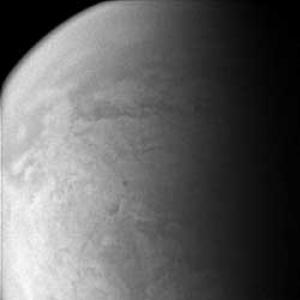Researchers have identified molecules in the atmosphere of Titan, one of the moons of the planet Saturn, and they are probably responsible for the heavy fog that prevails there

A haze covers Titan's atmosphere.
Photo: NASA.
The atmosphere on Titan's moon is of great interest to researchers, because this moon is the only one in our solar system that resembles Earth in its features. Data collection from the Cassini spacecraft's spectrometer revealed unexpected heavy ion clouds a thousand kilometers above the star's surface. This ion is an organic compound of methane and nitrogen gas molecules that have been exposed to strong light from the sun, such as polycyclic aromatic hydrocarbons (PAH's) and similar compounds that contain nitrogen, and gradually they become more and more complex molecules, reaching a mass 8000 times greater than a hydrogen atom only.
These molecules sink into Titan's surface, forming a compound called 'taulin'. Taulin was first observed in an experiment that took place in 1953, in which organic molecules that evolved through an inorganic chemical process were presented. Therefore, they may be among the first materials for the creation of life.
Dr. Andrew Coates from UCL University (University College) in London and co-author of the article, says, "It would be modest to think that with the help of our instruments on the moon Titan, we might be able to understand the first processes of the formation of our atmosphere, thanks to which life on Earth is created. Hence, the atmosphere on Titan is actually a factory for organic chemicals. To see heavy negative ions was a big surprise for us, and this is a key to looking for connections in the process of the formation of the atmosphere and the surface of the moon Titan, and possibly also in other moons of Saturn."
The finding was published on May 11, 2007 in the journal Science, and from a collaboration between NASA, the European Space Agency and the Italian Space Agency.
Translated: Yariv Zerbiv
Source: University of London (UCL) press release for the website, Science Daily.

One response
"Would it be humiliating"?